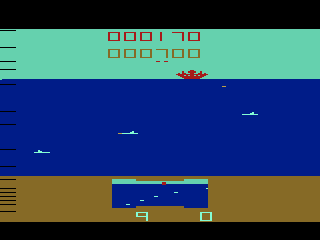Retro Replay Review
Gameplay
Deep Scan places you at the helm of a lone destroyer tasked with annihilating passing submarines using timed depth‐charge drops. You must watch your viewport at the bottom of the screen—your makeshift radar—to predict submarine paths before they enter the main play area. Proper timing is essential: drop too early and your charge blasts harmlessly in empty water; drop too late and the sub slips by unscathed.
(HEY YOU!! We hope you enjoy! We try not to run ads. So basically, this is a very expensive hobby running this site. Please consider joining us for updates, forums, and more. Network w/ us to make some cash or friends while retro gaming, and you can win some free retro games for posting. Okay, carry on 👍)
Scoring hinges on depth: the deeper the sub when your charge detonates, the more points you rack up. A second score line tracks bonus potential when a special colored sub glides past. This bonus sub emits a unique ping, and only by hitting it can you claim your accumulated bonus. Until then, the bonus meter simply taunts you with what could have been.
Below the viewport, a small counter warns you how many subs may escape before game over. Starting at ten, it ticks down with every sub that evades your charges. On its right, a speed indicator climbs from zero to nine as your cumulative score rises—faster subs test your reflexes and make every drop more challenging.
Bonus mechanics add a strategic layer: each non-bonus sub you sink increases the value of the bonus sub, but slaying that special target resets the bonus payout to its base level. Mastering this risk‐reward cycle is key to high‐score runs. And if you’re playing the Arcade original, watch out—enemy subs will fire torpedoes up at your ship. The Atari 2600 port removes this threat, trading intensity for pure charge-dropping simplicity.
Graphics
Despite its vintage roots, Deep Scan’s visuals remain clear and purposeful. Submarines are rendered in distinct colors that help you track standard and bonus targets at a glance. Explosions are crisp, with simple flash effects that provide satisfying feedback when a depth charge finds its mark.
The radar viewport is minimalist yet effective: a solid black background with brightly colored icons ensures subs never get lost in the clutter. The water column itself is a gradient of blues, giving a sense of depth without distracting from the core gameplay. Text and number displays are bold and legible, keeping you informed of escapes and speed at a glance.
On Arcade cabinets, cabinet artwork and attract-mode animations added flair, but the core playfield remained laser-focused on charge timing. The Atari 2600 version maintains all essential elements, though colors are slightly muted and sprites blockier. Even so, it’s instantly recognizable and preserves the urgent feel of the arcade original.
While Deep Scan doesn’t push graphical boundaries, its art style is purpose-driven. Each visual component serves gameplay clarity, allowing you to concentrate on timing and strategy rather than flashy distractions. That design choice helps Deep Scan stand the test of time.
Story
Deep Scan doesn’t weave a deep narrative tapestry—its premise is straightforward: you are the destroyer, lurking above the waves, hunting enemy subs below. There’s no crew dialogue or cutscenes; the story unfolds through each successful depth charge and each submarine escape.
This bare-bones setup places you directly in the captain’s seat, where every ping on your radar tells a tale of pursuit and evasion. The occasional bonus sub transforms into a small victory arc within each wave, offering brief but meaningful narrative peaks as you chase that high‐value target.
Though there’s no evolving plot or character progression, Deep Scan’s scenario evokes classic Cold War naval skirmishes. The simplicity of the mission—hunt or be hunted—creates an immediate connection to arcade-era games where gameplay carried the narrative weight.
Ultimately, Deep Scan’s story is what you make of it: a test of reflexes, an exercise in risk management, and a battle of wills against unseen foes beneath the waves. That minimalist approach leaves room for your own imagination to fill in the gaps.
Overall Experience
Deep Scan excels as a pick-up-and-play arcade challenge. Its core loop—watch the radar, time the drop, tally the score—is easy to learn but hard to master. The escalating sub speeds and escape limit keep tension high, ensuring each session ends on a nail-biting note.
Casual players will appreciate its straightforward mechanics and short play sessions. High‐score chasers will find depth in mastering bonus cycles and perfecting timing at top speed levels. The contrast between the arcade version’s torpedo threat and the Atari port’s focus on charge timing gives each release its own flavor.
While there’s no sprawling world or lengthy campaign, Deep Scan thrives on precision and replayability. Its clean visuals and immediate feedback loop make every explosion feel rewarding. The bonus-sub mechanic injects just enough suspense to keep you coming back for “one more run.”
If you’re drawn to retro arcade feel, enjoy timing-based challenges, or simply want a distilled naval combat experience, Deep Scan delivers. It may look simple by modern standards, but its fast‐paced depth-charge action still packs plenty of thrill beneath the waves.
 Retro Replay Retro Replay gaming reviews, news, emulation, geek stuff and more!
Retro Replay Retro Replay gaming reviews, news, emulation, geek stuff and more!









Reviews
There are no reviews yet.